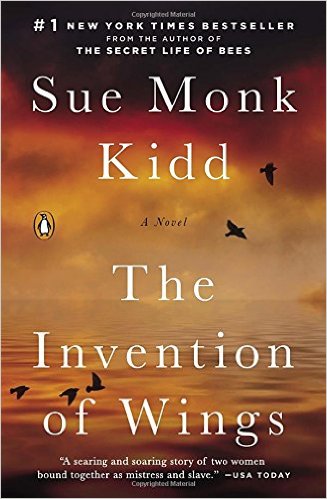Tag Archives: book club recommendations
A Book for Now: Behold the Dreamers by Imbolo Mbue
 Imbolo Mbue’s novel Behold the Dreamers has been on my mind as I’ve read about the thousands of migrants from Central America walking the long miles toward the United States. The fictional story about Jenda Jonga, an immigrant from Cameroon, could be the story of so many people who see America as the promised land. One of America’s central myths is that of the poor immigrant who amasses riches. Mbue’s take on it is powerful and original.
Imbolo Mbue’s novel Behold the Dreamers has been on my mind as I’ve read about the thousands of migrants from Central America walking the long miles toward the United States. The fictional story about Jenda Jonga, an immigrant from Cameroon, could be the story of so many people who see America as the promised land. One of America’s central myths is that of the poor immigrant who amasses riches. Mbue’s take on it is powerful and original.
Mbue herself is the embodiment of the immigrant success story. In 1998, an aunt sponsored her to come from her native Cameroon to study at Rutgers University. She went on to get a master’s degree from Columbia University. Behold the Dreamers, her debut novel, landed a million-dollar advance.
McEwan’s The Children Act: The Novel or the Movie?
 I’ve never been eager to see movies based on books, mostly because they never live up to the original, but I’m willing to make an exception when Emma Thompson is the star. That’s how I found myself at a showing this week of The Children Act, an almost-excellent film based on the novel of that name by Ian McEwan.
I’ve never been eager to see movies based on books, mostly because they never live up to the original, but I’m willing to make an exception when Emma Thompson is the star. That’s how I found myself at a showing this week of The Children Act, an almost-excellent film based on the novel of that name by Ian McEwan.
The film and the book both come to life in the opening scenes. We meet Fiona, a British High Court judge in the Family Division, wrestling with multiple cases that defy easily solutions, even as she’s confronted with a crisis in her marriage. Her husband of 35 years, frustrated by Fiona’s lack of interest in sex, has just demanded that she let him have an affair with a younger woman.
A Book That’s Music to the Ears
 The book group I facilitate at a senior center was humming with excitement at our recent meeting. Our book was The Music Shop by Rachel Joyce, and all ten readers loved it.
The book group I facilitate at a senior center was humming with excitement at our recent meeting. Our book was The Music Shop by Rachel Joyce, and all ten readers loved it.
We’ve had plenty of lively meetings at which some members expound, politely of course, on why a book isn’t at all good and others on why it’s stunningly beautiful. The only dissension this time was over which character was the most interesting, which scene the most beautiful, or which description of music the most memorable. There were many to choose from.
In every chapter Joyce names at least one composer, composition, singer, or songwriter. I counted about 80 total in the book, ranging from Pérotin’s Beata Viscera of the 13th century to Michael Jackson’s Bad of 1987, the year before most of the book’s action takes place.
It’ll Soon be Time to Enjoy HARD CIDER
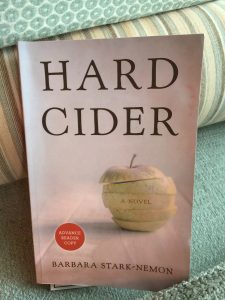 I’ve often written about my admiration of and appreciation for small, independent book publishers, those folks who are in the business much more because of their love of books than their pursuit of the next big blockbuster. Publishing these days has an ever-slimming profit margin amid fierce competition, and that makes things even more challenging for those who do this for love.
I’ve often written about my admiration of and appreciation for small, independent book publishers, those folks who are in the business much more because of their love of books than their pursuit of the next big blockbuster. Publishing these days has an ever-slimming profit margin amid fierce competition, and that makes things even more challenging for those who do this for love.
A small publisher that has drawn positive attention for its business model and a gratifying level of success is She Writes Press. In 2016, books from She Writes Press were awarded seventeen medals at the Independent Publisher Book Awards, the most awards to one press in that year. Under the guiding hand of publisher Brooke Warner, the press has gone from a catalog of eight titles in 2013 to an impressively long list for both spring and fall in this, their six year.
BAD HISTORY CAN MAKE GOOD FICTION
Inspiration for good novels can come from anywhere. Sometimes stories 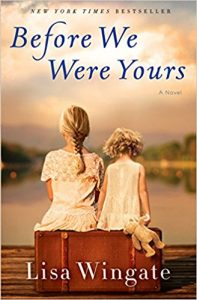 spring from experiences in the author’s life. Other times they explore experiences the author never had but wonders about. Recently I read two very good novels that were heavily influenced by horrific events of the recent past, and they started my thinking about how authors can use such events to give life to engrossing characters and spellbinding stories.
spring from experiences in the author’s life. Other times they explore experiences the author never had but wonders about. Recently I read two very good novels that were heavily influenced by horrific events of the recent past, and they started my thinking about how authors can use such events to give life to engrossing characters and spellbinding stories.
The first novel, Before We Were Yours, draws on the history of the Tennessee Children’s Home Society, run by Georgia Tann in Memphis during the first half of the twentieth century. The Society was well respected until the 1940s when authorities discovered that Tann had destroyed most of the adoption papers to cover up how many children were taken illegally from their parents to be offered to film stars and other wealthy clients for exorbitant adoption fees.
Ali Smith’s Stunning Seasonal Quartet
 Ali Smith—Scottish, 55, fearless—has already made a reputation as one of most ambitious, offbeat, and mesmerizing novelists of our time. Now she’s pushing it a step further with an unusual “seasonal” quartet. The first two volumes, Autumn and Winter, are already out, and you better hurry up and read them because you want to be ready when Spring arrives. And it won’t be long.
Ali Smith—Scottish, 55, fearless—has already made a reputation as one of most ambitious, offbeat, and mesmerizing novelists of our time. Now she’s pushing it a step further with an unusual “seasonal” quartet. The first two volumes, Autumn and Winter, are already out, and you better hurry up and read them because you want to be ready when Spring arrives. And it won’t be long.
The novels are being rushed out, but Smith has her reasons. She wants to put her mark on current events. Most writers of contemporary fiction struggle with an age-old dilemma: Is it better to be timely or timeless? Smith is one of the few with the talent to be both.
Autumn was published in 2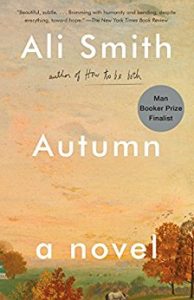 017, barely eleven months after the Brexit vote, and it serves partially as a novel of protest over what Smith clearly believes was a misguided decision by Britain to leave the European Union.
017, barely eleven months after the Brexit vote, and it serves partially as a novel of protest over what Smith clearly believes was a misguided decision by Britain to leave the European Union.
AN IDEA THAT MATTERS
The first thing that intrigued me about the novel I’m about to review was the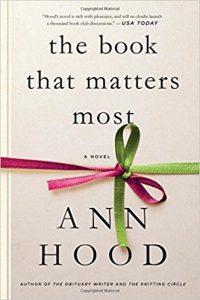 title: The Book That Matters Most. With all the great books in the world, choosing one that matters most seems nearly impossible, so I was curious to see where the author would lead me. The second thing that intrigued me was the main character, Ava, whose husband has recently left her for a woman who attempts to personalize public places by covering objects with colorful yarn.
title: The Book That Matters Most. With all the great books in the world, choosing one that matters most seems nearly impossible, so I was curious to see where the author would lead me. The second thing that intrigued me was the main character, Ava, whose husband has recently left her for a woman who attempts to personalize public places by covering objects with colorful yarn.
But the deeper I got into the novel, I found I was most captivated by the idea that novels have the power to change lives. I’ve written before about the way fiction can decrease readers’ needs to reach quick conclusions in their thinking and to avoid ambiguity and confusion.
Richard Ford’s Bascombe, A Jersey Guy
 As a transplanted but still loyal New Jerseyite, I was skeptical when a friend recommended Richard Ford’s book Let Me Be Frank with You as a humorous take on Hurricane Sandy. I couldn’t imagine anything funny about the storm that leveled large swaths of my former state, but I was curious to see how anyone could. While I differ with her characterization of this as a humorous take, I wholeheartedly agree with her recommendation of this book.
As a transplanted but still loyal New Jerseyite, I was skeptical when a friend recommended Richard Ford’s book Let Me Be Frank with You as a humorous take on Hurricane Sandy. I couldn’t imagine anything funny about the storm that leveled large swaths of my former state, but I was curious to see how anyone could. While I differ with her characterization of this as a humorous take, I wholeheartedly agree with her recommendation of this book.
Let Me Be Frank with You is humorous the way Chaplin’s Little Tramp was humorous, the way Larry David’s “Curb Your Enthusiasm” is humorous, and the way life is humorous. There’s artistry in blending the bitter and the sweet, and Ford is a master at it.
Looking for Improvement? Discover Joan Silber
 For too long, Joan Silber has labored in the shadows, her work overlooked, underappreciated and read by too few. I’m here to correct that. Or at least give it my best shot.
For too long, Joan Silber has labored in the shadows, her work overlooked, underappreciated and read by too few. I’m here to correct that. Or at least give it my best shot.
I just completed her latest novel, Improvement, and it is a stunning work, full of subtlety and insight, conveying an understanding of how ordinary people struggle to make something of their lives. Politicians who want to connect with “real” Americans would have a better chance of doing so if they studied Silber’s work, beginning with Improvement.
Reviews often describe this novel as one of linked short stories, but I don’t think that’s fair. While most of the chapters can stand on their own (and some were published that way), they are more linear and more intertwined than the linked-story novels you may be used to (think Elizabeth Strout’s Anything Is Possible or Olive Kitteridge).
In Praise of President James Garfield and His Biographer
 A good novel can keep readers turning the pages as they try to guess what will happen. Nonfiction writers have the challenge of keeping readers interested even if they know what will happen. Candice Millard succeeds beautifully in Destiny of the Republic: A Tale of Madness, Medicine and the Murder of a President, a page-turner about a president most Americans never think of, James A. Garfield. With her skillful storytelling, she brings the long-forgotten president to life and shows him to be a man of courage, brilliance, modesty, integrity, and goodness.
A good novel can keep readers turning the pages as they try to guess what will happen. Nonfiction writers have the challenge of keeping readers interested even if they know what will happen. Candice Millard succeeds beautifully in Destiny of the Republic: A Tale of Madness, Medicine and the Murder of a President, a page-turner about a president most Americans never think of, James A. Garfield. With her skillful storytelling, she brings the long-forgotten president to life and shows him to be a man of courage, brilliance, modesty, integrity, and goodness.
Garfield, the twentieth U.S. president, was shot just four months after his inauguration and died eleven weeks later. His short tenure robbed him of any chance at achievements and renown.
A Book to Capture Your Imagination
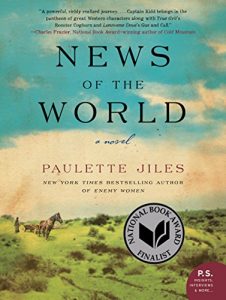 The 2016 novel News of the World by Paulette Jiles is beautiful, poetic, and riveting, and takes you to a world that’s familiar but full of mystery, all in just 240 pages. It fascinated me so much that I immediately sought out information on the history behind the fiction — the lives of children captured by Native Americans in mid-nineteenth-century Texas.
The 2016 novel News of the World by Paulette Jiles is beautiful, poetic, and riveting, and takes you to a world that’s familiar but full of mystery, all in just 240 pages. It fascinated me so much that I immediately sought out information on the history behind the fiction — the lives of children captured by Native Americans in mid-nineteenth-century Texas.
News of the World tells the story of Captain Jefferson Kyle Kidd, a seventy-one-year-old widower and Army veteran who travels the towns of North Texas entertaining audiences by reading selected articles from national and international newspapers. After one reading, an acquaintance, Britton Johnson, asks him to return a ten-year-old white girl to an aunt and uncle, her nearest living relatives, who live hundreds of miles away, near San Antonio.
Richard Russo’s Take on Academia
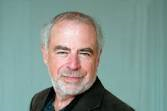 I don’t normally use this space to review twenty-year-old books, but for Richard Russo, I’ll make an exception. Regular readers know I’m a huge Russo fan. He’s been a big influence on my own writing, and I thought I’d read everything he wrote. But last month a friend recommended one of his novels that I’d missed: Straight Man, published in 1997. It’s the funniest serious novel I’ve ever read.
I don’t normally use this space to review twenty-year-old books, but for Richard Russo, I’ll make an exception. Regular readers know I’m a huge Russo fan. He’s been a big influence on my own writing, and I thought I’d read everything he wrote. But last month a friend recommended one of his novels that I’d missed: Straight Man, published in 1997. It’s the funniest serious novel I’ve ever read.
The narrator, William Henry Devereaux Jr., is heir to a famous name and not much else. He’s a writing professor and temporary chair of the English Department at a third-rank state college in a small fictional town in Pennsylvania. Hank’s father, who looms large throughout the book, was a hugely successful academic and literary critic and a hugely unsuccessful human being.
A Fourth Look at a Great Book: The Virginian by Owen Wister
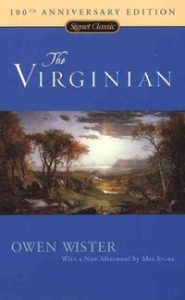 Some people seek comfort food, but I tend toward comfort books. Comfort books are the ones I return to when the problems of the day become too much. They’re my macaroni and cheese without the calories.
Some people seek comfort food, but I tend toward comfort books. Comfort books are the ones I return to when the problems of the day become too much. They’re my macaroni and cheese without the calories.
A few weeks ago, as Americans seemed at war with Americans, I turned to one of my comfort books, The Virginian: A Horseman of the Plains by Owen Wister. This 1902 novel was required reading when I was in junior high school. I loved it then and loved it again when I reread it in 1980, 1991, and late this summer. The book belongs near the top of any list of great American novels.
I feel almost apologetic for enjoying the book. There’s much in it to make 21st-century Americans shudder, including racial epithets, vigilante justice, and sexism.
Reading Elizabeth Strout as a Writer Would
A Writer Reads Elizabeth Strout
 Writing fiction will change the way you read it. I often make a point of reading like a writer (to borrow Francine Prose’s book title), examining what the author is trying to do and how she’s doing it, determining what works and what doesn’t (and why), and looking for how this can help improve my own writing. It doesn’t stop me from reading as a reader—enjoying good literature and losing myself in fictional worlds—but I rarely lose sight of what the author is doing to and for me.
Writing fiction will change the way you read it. I often make a point of reading like a writer (to borrow Francine Prose’s book title), examining what the author is trying to do and how she’s doing it, determining what works and what doesn’t (and why), and looking for how this can help improve my own writing. It doesn’t stop me from reading as a reader—enjoying good literature and losing myself in fictional worlds—but I rarely lose sight of what the author is doing to and for me.
And when I read really good fiction—the kind that strikes a chord deep within—the writer in me usually has two reactions. First, I’m inspired and I want to rush to the computer to try to create a similar gift for my readers.
MY SUNSHINE AWAY—WHAT HAPPENED WHEN I WASN’T LOOKING
Most novels that include an assault in the plot feature that assault as 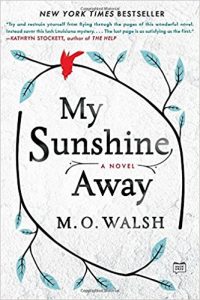 the main event. One of the beauties of M.O. Walsh’s debut novel My Sunshine Away is that the rape described on page one is not the main event, no matter how much the young narrator wants to think it is.
the main event. One of the beauties of M.O. Walsh’s debut novel My Sunshine Away is that the rape described on page one is not the main event, no matter how much the young narrator wants to think it is.
At age 14, the narrator, who remains nameless throughout the story, is infatuated with his 15-year-old neighbor Lindy. So, when she is attacked coming home from track practice one summer night in 1989, he thinks the world as he knows it is destroyed. Through his remaining adolescence, he sees life through the prism of the rape and how it affects Lindy’s relationship with him, while all around him so much else is happening that belies the idyllic quality of his southern neighborhood and that will shape him into the adult he becomes.
Review: Chickens, Mules and Two Old Fools
A Morsel for the Armchair Traveler
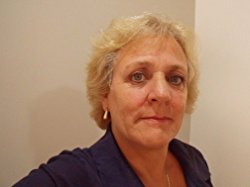 Planes are crowded, hotels are booked, and families are streaming to their vacation destinations. Those of us staying put in these sultry summer days can do worse than read the adventures of people lucky enough to travel abroad.
Planes are crowded, hotels are booked, and families are streaming to their vacation destinations. Those of us staying put in these sultry summer days can do worse than read the adventures of people lucky enough to travel abroad.
Victoria Twead’s hilarious memoir, Chickens, Mules and Two Old Fools, more than fits the requirement of an armchair getaway. Twead takes readers from her Sussex home, on England’s southern coast, to a tiny mountain village in Andalucia, on Spain’s southern coast.
THE INVENTION OF WINGS—EXPLORING THE SOUL OF A WOMAN WHO LEARNED TO FLY
Ever since The Invention of Wings by Sue Monk Kidd was released 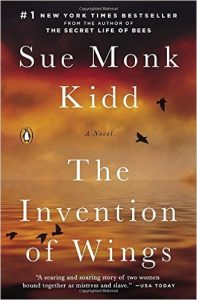 in 2014, I’ve heard it described as the story of the relationship between a white girl and the enslaved black girl who is given to her as her personal maid on her eleventh birthday. The novel is that story, but its deeper story is the evolution of the white girl, Sarah Grimké, into not only a leader of the abolitionist movement but also one of the first proponents of women’s rights.
in 2014, I’ve heard it described as the story of the relationship between a white girl and the enslaved black girl who is given to her as her personal maid on her eleventh birthday. The novel is that story, but its deeper story is the evolution of the white girl, Sarah Grimké, into not only a leader of the abolitionist movement but also one of the first proponents of women’s rights.
Sarah Grimké was a real person who was born into Charleston aristocracy and grew up there in the years before the U.S. Civil War. Kidd used diaries, letters, newspaper accounts, and Sarah’s own writing as well as biographical material to learn the facts of Sarah’s life and many of her desires, struggles, and motivations.
Nobel Prize Winner Patrick Modiano’s Dora Bruder
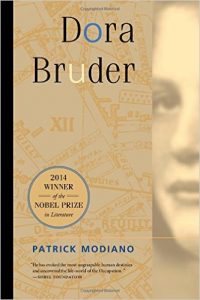 Last year when the Nobel Prize in Literature went to Bob Dylan, many people responded with the question, Why? Two years earlier when the Nobel Prize committee named Patrick Modiano the recipient of its literature prize, another question was often asked, Who?
Last year when the Nobel Prize in Literature went to Bob Dylan, many people responded with the question, Why? Two years earlier when the Nobel Prize committee named Patrick Modiano the recipient of its literature prize, another question was often asked, Who?
Though Modiano had published about thirty works in his native France, he was almost unknown in this country. Only a dozen of his novels had been translated into English, and the publishing house David R. Godine, which had published three of them, sold only about 8,000 copies.
The Nobel Prize changed that, and we readers are the beneficiaries.
HOW DO YOU FIND A NOVEL?
 Are you currently reading a novel? How did it land on your reading list?
Are you currently reading a novel? How did it land on your reading list?
